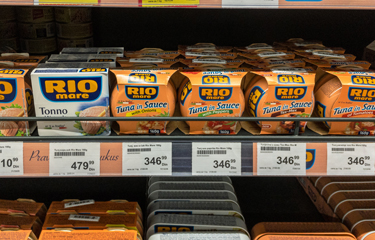Milan, Italy-based Bolton Food has announced a partnership with the nonprofit Oxfam International on a project to improve human rights standards in the global tuna supply chain.
Bolton, which purchased Washington, U.S.A.-based tuna firm Tri Marine in July 2019, and which operates the Rio Mare, Saupiquet, ISABEL, and Cuca tuna brands in Europe, said it will work with Oxfam to form a process to evaluate, review, and implement standards of for human rights throughout its supply chain.
Oxford, England-based Oxfam is a group of 20 independent charitable organizations focused on the alleviation of global poverty. Bolton will work with Oxfam to create new standards of corporate social sustainability for its fishing operations, which will be scalable to the broader fishing industry globally.
"As industry leaders in the world, Bolton has a humane and balanced view of the economy that should serve people and not the other way around. Our idea of inclusive sustainability encouraged us to collaborate with important and reputable partners to meet the challenges of environmental and social problems," Bolton Group CEO Giuseppe Morici said in a press release. "Just as we have been working with WWF for the past four years to ensure sustainable fishing and protect ocean health, with the goal of ensuring that 100 percent of our supply comes from sustainable sources by 2024, the goal of this collaboration with Oxfam is to begin a process to further strengthen our social responsibility. We will work together, side by side, as only a constant and constructive exchange of ideas will allow us to implement an increasingly ambitious best practice designed to push the entire industry into new horizons."
The objective of the standards, according to Bolton Food Spain Managing Director Oscar Vicente, is “to build an increasingly equitable supply chain, where inclusion, elimination of inequality, gender equality, respect for human rights, and safe and decent working conditions are guaranteed for all people involved in the supply chain.”
That will be no easy process, due to the length and complexity of the tuna supply chain, which typically travels through multiple countries, each with their own legal and cultural models. The fact that many tuna-fishing vessels are at sea for long periods of time that they operate under different flags contributes increasing the risk that human rights violations could potentially occur, Vicente said.
The partnership with Oxfam will be based off a similar accord Bolton formed in 2017 with WWF to improve its environmental sustainability standards and performance. The partnership will operate based off a four-year roadmap that runs through 2024. It will begin with an in-depth analysis of the global tuna supply chain with the development of a due diligence process in Ecuador, Morocco, and Indonesia – three countries identified as key to Bolton’s supply chain – through the Human Rights Impact Assessment methodology.
"Bolton's commitment to embarking on this partnership with Oxfam is certainly pioneering. In fact, we are confident that it will represent a benchmark that all other companies in the industry will strive to achieve,” Oxfam Italia CEO Roberto Barbieri said. “We want to contribute to changing business policies and practices that will benefit both the supply chain and the rest of the company's stakeholders. Thanks to this partnership, Bolton Food is committed to reviewing its business model in accordance with the principles of the human economy promoted by Oxfam, in order to safeguard the rights of all people. This collaboration will enable the review and development of corporate policies and practices that guarantee human rights and more equitable and inclusive business models."
Bolton said it had embarked on a pursuit of more organized human rights standards in response for a global call for companies to implement and commit to policies that address environmental and social sustainability. Consumers are becoming “increasingly aware and accountable in their purchasing behaviors,” according to Bolton, and are more willing to pay a surcharge to ensure their products have sustainable origins.
“Thanks to this pioneering due diligence model that will be developed under this partnership, Bolton Food will also set a good example for other companies that will positively influence the commercial dynamics of the entire fishing industry,” the company said.
Photo courtesy of BalkansCat/Shutterstock







